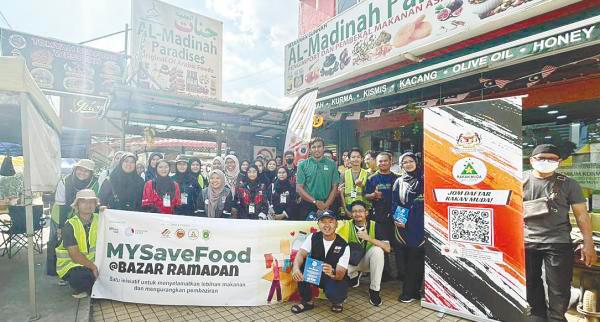PETALING JAYA: MYSaveFood has collected a total of 11.8 tonnes of unsold food and beverages from Ramadan bazaars nationwide from March 14 to 20.
Worth RM156,600, the food was redistributed to needy communities nearby, universities, People’s Housing Programme residences, Orang Asli and the homeless.
Project director Mohammad Harith Mohd Tarik said last year, it saved 25 tonnes of food worth over RM281,000 throughout Ramadan. It was collected from 55 bazaars nationwide and benefited 10,000 people.
“This initiative to save surplus unsold food and beverages from Ramadan bazaar vendors and redirect them to the needy has reduced food waste at disposal sites. It also decreased the production of methane gas from waste decomposition.”
He said the project was started in 2016 as part of MYSaveFood’s commitment to addressing the global problem of food loss and waste, which aligns with the UN Food and Agriculture Organisation’s global initiative.
Mohammad Harith said while the main purpose of MYSaveFood’s initiative is to reduce food waste and redistribute unsold food and drinks to the needy, it also serves as a platform for youth volunteerism.
“Apart from enhancing our youth’s soft skills and providing them an outlet to be involved in meaningful initiatives, it also helps to reduce carbon dioxide and greenhouse gas emissions.
“Through the data collected from our campaign, we aim to raise awareness in society about the importance of valuing food and minimising waste.”
He said the objectives align with the Sustainable Development Goals (SDG) 12.3 to halve per capita global food waste and SDG 2, which aims to achieve zero hunger.
Based on MYSaveFood’s statistics, he said the holy month of Ramadan is making a direct impact on SDG 12.3.
Mohammad Harith said MYSaveFood plans to recruit over 2,500 volunteers this year, which is a significant increase from last year’s 1,500. Thus far, it has recruited 780 volunteers.
“Before kicking off the initiative, volunteers briefed vendors about its objectives and the standard operating procedures (SOP). Vendors typically place their surplus food and drinks on our designated tables where volunteers collect them after Maghrib prayers.”
Mohammad Harith said surau and mosques constituted a small portion of the recipients, depending on the locations of the Ramadan bazaars. Higher priority is being given to those who have the greatest need.
He said desserts were collected the most and totalled 2.13 tonnes, worth RM42,712.20, while drinks totalled 6.7 tonnes, worth RM40,350.
Volunteer Nur Aqilah Mat Dahalan, 25, said MYSaveFood was carrying out a crucial service as vendors would typically discard their leftovers or donate them to mosques without prior screening.
“Through MySaveFood’s SOP, we filter the food before distributing it. Any expired food is promptly discarded.
“As we are entering our eighth year of the project, vendors are starting to appreciate the initiative and are more aware of us as a reliable organisation which delivers food to the needy.
“I have also noticed that food vendors are becoming better at controlling the quantity of food they sell to avoid wastage,” she said.
Mohammad Harith expressed hope that the initiative will expand to include collecting used cooking oil, composting food waste, and retort processing where food life is extended through a method of heating and pressurising it.
“Through continuous innovation and strategic planning, MYSaveFood endeavours to amplify its positive impact and contribute to building a more resilient and equitable food redistribution system.”
Mohammad Harith said the initiative has attracted hundreds of collaborations, including with the Domestic Trade and Cost of Living Ministry, other government agencies, universities, and NGOs.










